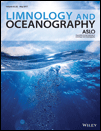
LIMNOLOGY AND OCEANOGRAPHY
Scope & Guideline
Empowering Scholars to Influence Policy and Conservation
Introduction
Aims and Scopes
- Aquatic Ecosystem Dynamics:
Research on the interactions among biotic and abiotic components within freshwater and marine environments, focusing on nutrient cycling, food webs, and community dynamics. - Climate Change Impacts:
Studies examining how climate change affects aquatic ecosystems, including shifts in species distributions, phenology, and ecosystem functions. - Biogeochemical Cycling:
Investigations into the cycling of essential elements such as carbon, nitrogen, and phosphorus in aquatic systems, and how these cycles are influenced by environmental variables. - Microbial Ecology:
Research on microbial communities in aquatic environments, including their roles in biogeochemical processes and their responses to changes in nutrient availability and climate. - Aquatic Biodiversity and Conservation:
Studies focused on the diversity of aquatic organisms and the impacts of human activities on their habitats, with an emphasis on conservation strategies. - Innovative Methodologies:
Development and application of new techniques for studying aquatic systems, including remote sensing, modeling, and high-resolution observational methods.
Trending and Emerging
- Impact of Anthropogenic Factors:
There is a growing emphasis on understanding how human activities, such as pollution, land use changes, and climate change, influence aquatic ecosystems and their resilience. - Microplastics and Contaminants:
Research on microplastics and chemical contaminants in aquatic systems has surged, focusing on their ecological impacts, transport mechanisms, and mitigation strategies. - Ecosystem Services and Blue Carbon:
Studies investigating the role of aquatic ecosystems in providing ecosystem services, particularly related to carbon sequestration and climate regulation, are gaining traction. - Integrative Approaches to Ecosystem Management:
An increase in interdisciplinary studies that combine ecological, hydrological, and socio-economic perspectives to manage and restore aquatic ecosystems is evident. - Technological Advances in Research:
Emerging technologies, such as machine learning and advanced remote sensing, are increasingly being integrated into aquatic research to enhance data collection and analysis.
Declining or Waning
- Traditional Limnology:
Research focusing solely on static limnological studies, such as basic water chemistry and physical properties, has decreased as more integrative and dynamic approaches are favored. - Long-term Monitoring Studies:
While long-term data remains valuable, there is a noted decline in studies that focus exclusively on traditional long-term monitoring without addressing emerging environmental issues. - Single Species Studies:
Research that concentrates on single species without considering ecosystem interactions has become less common as the trend shifts towards understanding complex ecological networks.
Similar Journals

MARINE AND FRESHWATER RESEARCH
Innovating research for a sustainable aquatic future.Marine and Freshwater Research is a prestigious journal published by CSIRO PUBLISHING that serves as a key platform for the dissemination of cutting-edge research in the fields of Aquatic Science, Ecology, and Oceanography. With an impactful presence since its inception in 1948, the journal provides critical insights into the dynamics of freshwater and marine ecosystems, promoting interdisciplinary approaches that contribute to our understanding of biodiversity and sustainability. Currently ranked in the Q2 category across major scientific domains, including Ecology and Aquatic Science, it enjoys a robust academic reputation supported by impressive Scopus rankings, such as Rank #66/247 in Aquatic Science and Rank #44/145 in Oceanography, reflecting its high citation impact and relevance. While offering a subscription-based access model, the journal remains dedicated to fostering dialogue and innovation within the scientific community, aiming to bridge the gap between research findings and practical applications in environmental management. Located in Australia, Marine and Freshwater Research is an essential resource for researchers, professionals, and students dedicated to exploring the complexities of aquatic ecosystems and advocating for their preservation.

Latin American Journal of Aquatic Research
Connecting Research and Innovation in Aquatic ScienceLatin American Journal of Aquatic Research (ISSN: 0718-560X) is a distinguished scholarly publication that has been paving the way for aquatic science research since its transition to Open Access in 2008, allowing unhindered access to diverse scientific inquiries conducted in Latin America and beyond. Published by Pontificia Universidad Catolica de Valparaiso in Chile, this journal serves as a vital platform for researchers and practitioners in the fields of Aquatic Science and Oceanography. With an esteemed Q3 ranking in both categories as of 2023, it is dedicated to disseminating high-quality research findings that address pressing ecological and biological challenges. The journal’s reach and impact are reflected in its Scopus rankings, where it stands at the 36th percentile in Oceanography and the 35th percentile in Aquatic Science. Researchers, professionals, and students alike will find valuable insights and data-driven articles that further the understanding of aquatic ecosystems, making it an essential resource for ongoing studies and future innovations.
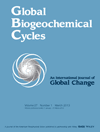
GLOBAL BIOGEOCHEMICAL CYCLES
Innovating research for a healthier planet.GLOBAL BIOGEOCHEMICAL CYCLES, published by the American Geophysical Union, is a leading journal in the field of geochemistry that has gained significant recognition since its inception in 1987. With an impressive impact factor and a Q1 ranking in multiple categories such as Atmospheric Science, Environmental Chemistry, and Global and Planetary Change, it serves as a crucial platform for the dissemination of high-quality research. This journal emphasizes interdisciplinary studies focusing on biogeochemical processes and their implications for global environmental change, attracting contributions from a diverse range of scientific communities. Researchers, professionals, and students engaged in atmospheric sciences, environmental chemistry, and planetary sciences will find invaluable insights and state-of-the-art methodologies within its pages. GLOBAL BIOGEOCHEMICAL CYCLES continues to advance our understanding of the Earth’s systems, thus holding a pivotal position in shaping future environmental policies and sustainability efforts.

Aquatic Biology
Championing Open Access to Aquatic KnowledgeAquatic Biology, published by INTER-RESEARCH, is a leading open-access journal dedicated to the scientific exploration of aquatic ecosystems, promoting innovative research in the fields of aquatic science, ecology, and oceanography since its inception in 2007. With an E-ISSN of 1864-7782, the journal publishes original articles, reviews, and data papers that contribute to the understanding of aquatic biology in its myriad forms. As of 2023, it holds a respectable Q3 ranking across multiple categories including Aquatic Science and Ecology, reflecting its sustained impact within the scientific community. Situated in Germany, Aquatic Biology operates a policy of open access since 2014, ensuring that valuable research findings are readily available to researchers, professionals, and students worldwide, thus fostering collaboration and knowledge dissemination. By addressing diverse aquatic topics, the journal plays a crucial role in advancing the study and conservation of marine and freshwater environments, making it an essential resource for anyone seeking to deepen their understanding of aquatic systems.
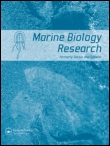
Marine Biology Research
Fostering collaboration in marine biology.Marine Biology Research is a premier journal published by Taylor & Francis, focusing on the dynamic field of marine biology and its intersecting realms of aquatic science, ecology, and oceanography. Since its inception in 2005, this journal has served as a crucial platform for researchers and professionals to disseminate their findings, with a vision extending to 2024 and beyond. The journal is recognized with a Q3 quartile ranking in both Aquatic Science and Ecology, Evolution, Behavior and Systematics, underscoring its growing influence in these fields as evidenced by its Scopus rankings. Located in the United Kingdom, Marine Biology Research aims to foster collaboration and innovation through open access options, facilitating knowledge exchange among the academic community. With a steady commitment to advancing marine sciences, this journal is an invaluable resource for those dedicated to understanding and preserving our ocean ecosystems.
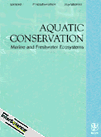
AQUATIC CONSERVATION-MARINE AND FRESHWATER ECOSYSTEMS
Driving impactful research for aquatic sustainability.AQUATIC CONSERVATION-MARINE AND FRESHWATER ECOSYSTEMS, published by WILEY, is a premier international journal dedicated to advancing the understanding of aquatic ecosystems and their conservation. With an impact factor reflecting its significant influence and a distinguished position in the Q1 quartile across key categories such as Aquatic Science, Ecology, and Nature and Landscape Conservation, this journal serves as an essential resource for researchers and professionals engaged in the study and protection of marine and freshwater environments. Covering a broad array of topics, from ecosystem management to conservation strategies, the journal encourages the dissemination of innovative research and interdisciplinary perspectives. Although it is not an open-access publication, this journal is esteemed for its rigorous peer-review process, facilitating a platform where vital research influences policy and practice in the aquatic sciences. Established in 1991, AQUATIC CONSERVATION continues to be a cornerstone in the academic exploration and safeguarding of aquatic ecosystems through to its converged years of 2024 and beyond, providing a critical lens for the future of environmental sustainability.
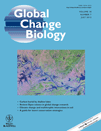
GLOBAL CHANGE BIOLOGY
Navigating the Complexities of Global Environmental ChangeGLOBAL CHANGE BIOLOGY, published by Wiley, is a leading journal dedicated to advancing the scientific understanding of the relationships between biological systems and global environmental changes. With an impressive impact factor placing it in the Q1 category across multiple disciplines—including Ecology, Environmental Chemistry, and Global and Planetary Change—this journal is essential for researchers, professionals, and students aiming to stay at the forefront of this dynamic field. The journal has a rich history since its inception in 1995, continually providing a platform for high-quality research that informs policy and management practices worldwide. Although it is not open access, the journal remains a valuable resource for those committed to exploring the complexities of ecological and environmental change. With a Scopus ranking of #3 in Global and Planetary Change and #6 in both Ecology and Environmental Chemistry, GLOBAL CHANGE BIOLOGY continues to shape the dialogue on the pressing environmental challenges of our time.

BIOGEOCHEMISTRY
Pioneering research at the intersection of environment and science.BIOGEOCHEMISTRY is an esteemed journal published by Springer, dedicated to advancing the understanding of biogeochemical processes across a range of ecosystems. Since its inception in 1984 and continuing into its converged trajectory through 2024, the journal has established itself as a critical resource in the fields of Earth-Surface Processes, Environmental Chemistry, and Water Science and Technology. With a prestigious Q1 ranking across these categories as of 2023, it ranks among the top journals in its field, reflecting its significant impact on current research and knowledge dissemination. Researchers, professionals, and students alike can benefit from the journal's rigorous peer-reviewed articles that contribute vital insights and innovative research findings. Although currently not an open-access journal, BIOGEOCHEMISTRY remains a leading platform for sharing high-quality scientific work that addresses pressing environmental challenges.
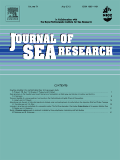
JOURNAL OF SEA RESEARCH
Fostering Interdisciplinary Insights in Marine ResearchJOURNAL OF SEA RESEARCH, published by Elsevier, is a premier academic journal dedicated to advancing knowledge in the fields of aquatic science, ecology, and oceanography. Since its inception in 1996, this journal has provided a vital platform for researchers and professionals to disseminate groundbreaking findings and promote fostering interdisciplinary discussions. With its impressive Q2 ranking in multiple categories, including Aquatic Science and Ecology, Evolution, Behavior and Systematics, it positions itself as a significant contributor to marine and environmental studies. The journal is accessible in both print (ISSN: 1385-1101) and online formats (E-ISSN: 1873-1414), ensuring wide reach and engagement within the scholarly community. Researchers and students alike will find the journal not only a reliable source of information but also a source of inspiration for future explorations. With a commitment to quality and a broad scope that spans fundamental to applied research, JOURNAL OF SEA RESEARCH remains an indispensable resource for understanding the complexities of marine environments and their relevance to our changing world.

Journal of Oceanology and Limnology
Fostering Dialogue on Aquatic SustainabilityJournal of Oceanology and Limnology, published by SCIENCE PRESS, is a premier academic journal dedicated to advancing the fields of oceanography and limnology. With an ISSN of 2096-5508 and E-ISSN 2523-3521, this journal has emerged as a vital resource since its inception, aiming to disseminate cutting-edge research and comprehensive studies on aquatic environments. Based in China and indexed with notable rankings in Scopus, including a Q2 category in Oceanography and a Q3 category in Water Science and Technology, this journal significantly contributes to knowledge in these crucial scientific disciplines. The H-index for the journal is currently being established, reflecting its evolving impact within the academic community. Moreover, the open access model promotes wider dissemination, ensuring that research findings are accessible to a global audience. Covering a diverse range of topics from ecosystem health to climate impact on water bodies, the Journal of Oceanology and Limnology aspires to foster interdisciplinary dialogue and innovation among researchers, professionals, and students engaged in understanding and preserving aquatic life.